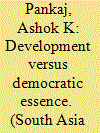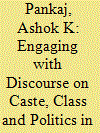|
|
|
Sort Order |
|
|
|
Items / Page
|
|
|
|
|
|
|
| Srl | Item |
| 1 |
ID:
091727


|
|
|
|
|
| Publication |
2009.
|
| Summary/Abstract |
This article reflects on the role of voters' preference for democratic essence over development-related issues in the 2005 Haryana and Bihar Assembly elections. Based on analysis of these elections, it is argued that in a society where the distributive effects of development are less than egalitarian, economic deprivations are reinforced by socio-political inequality, but democracy still promises to be a great equaliser and source of empowerment for the masses. Democratic issues therefore appear to have greater electoral and political appeal than promises of 'development' or small morsels of favour to entice an electorate. This finding indicates an increasingly sophisticated understanding of the Indian electorate about the critical relevance of democracy.
|
|
|
|
|
|
|
|
|
|
|
|
|
|
|
|
| 2 |
ID:
079533


|
|
|
|
|
| Publication |
2007.
|
| Summary/Abstract |
This article maps the changing profile of pre-Mandal and post-Mandal debates on caste, class and politics in India, showing that the centrality of caste as an agent of politics and its dominant role in public-political life has remained a reality throughout. What is contested now is the extent to which recognition of caste as an instrument of socio-political change (following the Mandal Commission) and caste-centric socio-political movements of the 1980s and 1990s (the Dalit and Backward Class movements) has reinforced caste-centric public-political life by giving it a modern value and a secular purpose.
The article argues that the contemporary elaborate discourses on caste, class, and politics in India should seek to develop new paradigms for the discussion of caste and should interrogate more vigorously the democratic and secular roles of caste in relation to class and politics
|
|
|
|
|
|
|
|
|
|
|
|
|
|
|
|
| 3 |
ID:
148516


|
|
|
|
|
| Summary/Abstract |
Talking about the transformational potentialities of ‘basic income’ in a place like India is a substantive declaration of the benefits of cash transfer, but this may be a fallacy. The study under review issues a clarion call to switch from the existing work- and commodity-based social security measures, mainly the Mahatma Gandhi National Rural Employment Guarantee Scheme (MGNREGS) and the Public Distribution System (PDS), to universal unconditional cash transfer. This seemingly attractive argument is based on a pilot action research, conducted in select villages of Indore District of Madhya Pradesh in 2011–12.1 The book’s initial tall claim is that ‘a modest basic income, paid monthly in cash, individually and without conditions, would be a means of achieving three development objectives [welfare, growth and emancipation] that taken together would be transformational’ (p. viii). The authors proclaim this again, soon after, urging that these benefits of welfare, growth and emancipation power of basic income, defined ‘as a sum paid regularly, in money, to individuals, without conditions, as a universal or rights-based payment, paid as an equal amount to all adults as citizens’ (p. 5), are greater than those of the MGNREGS and PDS. The arguments advanced in the book and the evidence of the pilot experiment would add to the armoury of the protagonists of cash transfers in India, who until now have pressed for this mostly as a leakage proofing mechanism (Kapur et al., 2008).
|
|
|
|
|
|
|
|
|
|
|
|
|
|
|
|
|
|
|
|
|